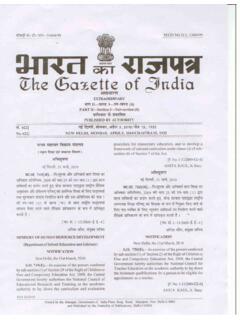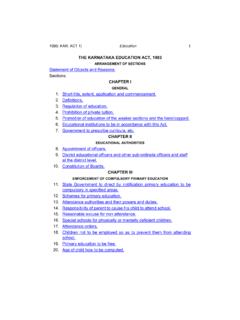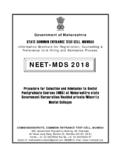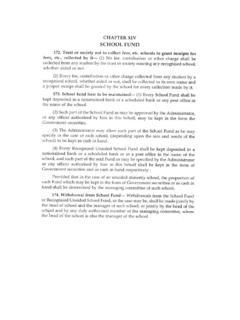Transcription of GOVERNMENT OF GUJARAT EDUCATION …
1 GOVERNMENT OF GUJARATEDUCATION DEPARTMENT The GUJARAT Elementary EDUCATION Rules, 2010(Proposed)ForewordEducation Department, GOVERNMENT of GUJARAT by its GR dated 31-3-2010 (Annex-A) constituted a Committee to re draft the GUJARAT ( Bombay )Primary EDUCATION Act, 1947 and GUJARAT Compulsory Primary EDUCATION Act, 1961 in the context of, and in consonance with The Right of Children to Free and Compulsory EDUCATION Act, 2009 (RtE Act) enacted by GOVERNMENT of India. The GR also mandated the Committee to draft rules and suggest procedure to give effect to provisions of admission of disadvantaged children and recognition of unaided schools in the RtE Committee co-opted a few members and held several meetings. It constituted three sub groups to work on(i)admission of disadvantaged children to unaided schools(ii)recognition of unaided schools(iii) GUJARAT (Bombay ) Primary EDUCATION Rules 1949 The Committee held meetings with teachers, school managements and association representatives in Ahmedabad, Surat, Vadodara and Rajkot and greatly benefited from their Committee submitted draft of GUJARAT Elementary EDUCATION Act to State GOVERNMENT in August 2010.
2 As requested by the EDUCATION Department, the Committee submitted draft rules on the admission of disadvantaged children and recognition of unaided schools in July 2010. Draft of revised GUJARAT Elementary EDUCATION Rules was submitted in January 2011. The Committee examined many complex and controversial issues associated with RtE Act. The thinking of the Committee on some of these issues is summarized in the following paragraphs as this will explain the reasons for some of its recommendations:1 The most contentious provision in the RtE Act is regarding admission of at least 25% disadvantaged children in unaided schools. During its visits and discussions the Committee discovered that most of the unaided schools have a high percentage of disadvantaged children on their rolls. These children today pay fees which are generally modest and well below the estimated per student cost for GOVERNMENT schools.
3 The Committee fears that to take unintended benefit under the RtE Act school managements will raise the fees upto reimbursement level and claim it from GOVERNMENT . It is for this reason that the Committee has recommended School Card system so that the benefit of admission to disadvantaged children is extended to the most deserving. The Committee also felt that the elite schools are reluctant to admit such children on their own initiative and the School Card system will ensure that they admit RtE Act lays down norms and standards which a new unaided school must fulfill for recognition. These norms prescribe minimum level of academic and physical infrastructure. If an existing school does not have the necessary infrastructure, it must provide it in three years to retain its recognition. The Committee was informed that there a large number of existing schools which will not be able to fulfill these norms due to physical and financial constraints.
4 The Committee was of the view that closure of these schools will seriously disrupt EDUCATION of hundreds of children. The Committee has therefore recommended that if such schools are able to show that they provide good quality EDUCATION then they should be allowed to continue. The Committee has drawn up minimum educational outcomes which such schools should continuously achieve and recommended that the academic evaluation should be done by independent Committee felt that the norms and standards prescribed by RtE Act will make establishment and running of unaided schools more expensive and the burden of higher fees will badly affect the middle and lower middle income families who aspire for good EDUCATION for their focus of RtE Act is to make available free and compulsory elementary EDUCATION to every child of the age of 6 to 14. The GUJARAT Elementary EDUCATION Rules provide for admission on completion of 5 years and schools have been admitting children to Class I accordingly.
5 If the age of admission is now made 6 years then there will be virtually no admissions to Class I in the first year as all six year olds would have progressed to Class II having been admitted to Class I the previous year. The Committee was therefore faced with a serious dilemma and finally decided to adhere to national norm of 6 years as age of admission, but recommended that if some parents desire their child should be admitted on completion of 5 years, schools should allow them admission. The Committee hopes that with greater spread of pre primary EDUCATION , this problem will get resolved during the next few RtE Act prescribes that in order to prepare children above the age of 3 years for elementary EDUCATION , and to provide early childhood care and EDUCATION to all children up to six tears of age, State Governments may make necessary arrangements for free pre school EDUCATION .
6 Pre primary EDUCATION in GUJARAT is unregulated by any law. Guidelines were issued in 1998 but there has been no serious effort to regulate pre primary EDUCATION . Schools run by local bodies do not have pre primary EDUCATION which is expected to be provided under Integrated Child Development Scheme (ICDS). The Committee had very heated discussion on the need or desirability of regulating pre primary EDUCATION . The Committee has recommended a set of basic regulations, based on the Guidelines of 1998 but feels that this subject needs a more detailed study and debate before any regulations are prescribed. The Committee feels that an Expert Committee should go into these issues RtE Act increases GOVERNMENT control in elementary EDUCATION and this could result in administrative malpractices. The Committee felt that there should be adequate checks and balances to reduce the opportunities for misuse of authority, particularly in the context of requirement of all unaided schools to obtain recognition.
7 The Committee has recommended that all applications for recognition should be examined not by EDUCATION Department but by committees consisting of retired teachers and GOVERNMENT officials, and educationists; and grant of recognition or otherwise should be based on the report of these independent committees. 6 The Committee has also recommended that the existing practice of annual inspections by EDUCATION Inspectors should discontinue as it no longer serves any useful purpose. The Committee has recommended that academic committees consisting of educationists should be given responsibility of academic supervision and guidance of elementary schools. The Committee has also recommended that reputed schools and other EDUCATION institutions should also be associated in academic supervision. Every elementary school should have the benefit of such supervision at least twice a year and the report of such supervision should be forwarded to CRCs and DIETS for providing suitable training and other academic assistance to teachers.
8 7 The RtE Act puts enormous responsibility on local bodies for successful implementation of free and compulsory elementary EDUCATION to all children within their jurisdiction. While District and Taluks Panchayats, and Municipal Corporations in GUJARAT are well equipped for this, most of the municipalities are not. The Committee was informed that out of 165 Municipalities and Municipal Corporations only 19 are providing elementary EDUCATION and such municipalities, are called authorized municipalities . The remaining 146 have resolved that they are not in a position to take this responsibility and the State GOVERNMENT has therefore entrusted this responsibility to the concerned District Panchayat. The Committee was informed that the main reason for the refusal of unauthorized municipalities to manage elementary EDUCATION was that State GOVERNMENT provided only 95% of expenditure and the remaining 5% was to be borne by the local body.
9 Since these municipalities did not have financial resources, they opted not to provide this service. The Committee was firmly of the view that ULBs cannot avoid this responsibility and recommended that as in the case of District Panchayats, State GOVERNMENT should fully reimburse to ULBs the expenditure on elementary EDUCATION . The Committee has also recommended that even though the financial position of Municipal Corporations is stronger, this is not their core function and they should also be provided full grants and not 85% as per the present practice. The Committee was of the view that primary EDUCATION is not covered under 74th Amendment and that local bodies discharge this responsibility as an agent of State GOVERNMENT and are therefore entitled to full reimbursement of Committee studied the Bombay Primary EDUCATION Act 1947 and Rules made there under in 1949, and found that most of the provisions of the Act and Rules are no longer relevant.
10 The Committee also found that while the GUJARAT Panchayts Act 1961 provided for constitution of EDUCATION Committees, the Bombay Municipalities Act did not have such provision. The Committee has faithfully retained all the provisions of RtE Act in so far as they pertain to State Governments, and also adopted with very minor modifications the draft model rules framed by GOVERNMENT of India. An important feature of the rules drafted by the Committee is that it entrusts responsibility on GCERT to lay down guidelines for training of teachers, procedures for continuous and comprehensive evaluation and benchmarks for learning outcomes. The Committee has also recommended periodic external evaluation of pre and in service teacher training programs and institutions, and quality of EDUCATION . In conclusion, I will like to thank all members of the Committee who contributed by their knowledge, experience and wisdom; and all officers of State EDUCATION Department who provided logistic and administrative support in this long and laborious exercise.








